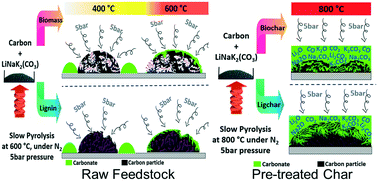The interplay between ternary molten carbonate and biomaterials during pressurized slow pyrolysis†
Abstract
The effect of pressure on the thermochemical conversion of woody biomass and lignin in the presence of carbonate additives has been investigated at moderate temperatures (600 and 800 °C). A ternary eutectic carbonate (Li2CO3: 43.5%, Na2CO3: 31.5%, K2CO3: 25%) was mixed with both raw feedstock and pre-pyrolysed chars and heated under nitrogen. Results of raw feedstock pyrolysis confirmed a temperature delay in volatile removal when pressure was increased to 5 bar up to 600 °C. In a carbonate treated mixture, above the eutectic melting point, liquid carbonate covered the carbon particle surfaces for both samples. On application of external pressure, this impacted the movement of gases generated in situ. Volatiles were given longer to react before being removed from the system. In the case of biomass, the combination of pressure and carbonate additive increased porosity of the final char. Lignin comparably did not show clear changes to its surface morphology when carbonate was present. However, carbonate did promote the rate of devolatilisation of lignin at reduced reaction temperatures. When temperature was increased to 800 °C and feedstock pre-pyrolysed without carbonate salts, the introduction of both carbonate and increased pressure were seen to significantly modify the final carbon structure of the char. Carbon/carbonate gasification at 800 °C under N2 changed the initial graphitic morphology of pre-pyrolysed biochar to an amorphous, disordered carbon. However, for initially amorphous lignin char, a final structure showing increased graphitic layering resulted after treatment with carbonate under pressure. This difference in structural changes is discussed to originate from a salt-catalysed process.



 Please wait while we load your content...
Please wait while we load your content...